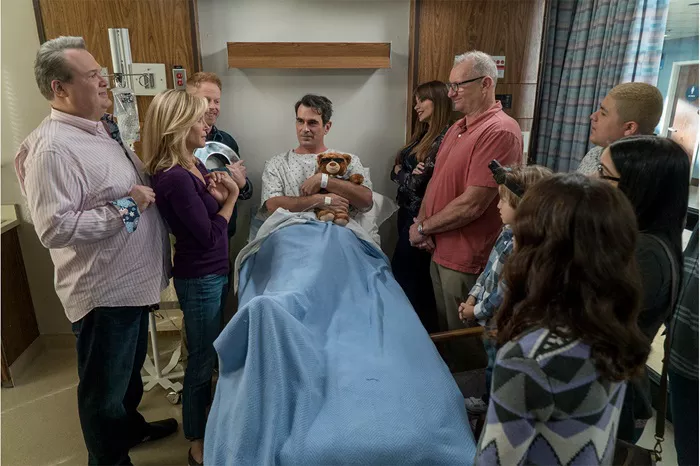“Modern Family,” a beloved sitcom that aired from 2009 to 2020, garnered critical acclaim and a massive fanbase for its humorous portrayal of a diverse, blended family. While the show has been praised for its groundbreaking representation and relatable humor, it has also faced criticism for various aspects of its content and portrayal of characters. This article delves into five significant reasons why “Modern Family” is considered problematic by some viewers and critics.
1. Stereotypical Representation
One of the main criticisms of “Modern Family” is its reliance on cultural and gender stereotypes. The show often portrays characters in ways that reinforce common stereotypes, rather than challenging them.
Manny Delgado’s Character
Manny Delgado, portrayed by Rico Rodriguez, is often depicted as a precocious and mature child, but his character is also heavily influenced by Latino stereotypes. His romantic nature and dramatic flair, while endearing, can be seen as a reinforcement of the “Latin lover” trope.
Gloria Pritchett’s Character
Gloria Pritchett, played by Sofia Vergara, is another character who falls into stereotypical representations. As a passionate and fiery Latina, Gloria’s character often plays into the “hot-tempered Latina” stereotype. Her heavy accent and exaggerated emotional expressions, while intended for comedic effect, have drawn criticism for perpetuating a narrow and often problematic view of Latina women.
2. Lack of Diverse Storylines
Despite having a diverse cast, “Modern Family” has been criticized for not delving deeply into the cultural and social issues that could have been explored through its characters.
Surface-Level Diversity
While the show features characters from different ethnic backgrounds and sexual orientations, the storylines often focus on typical family issues rather than addressing the unique challenges faced by these groups. This approach has led to accusations of the show engaging in tokenism rather than meaningful representation.
Missed Opportunities
For instance, the show could have explored Gloria’s immigrant experience in more depth, addressing issues such as cultural assimilation and identity struggles. Similarly, the experiences of Cam and Mitchell as a gay couple could have been a platform to address LGBTQ+ issues more robustly, but these themes were often sidelined in favor of more conventional sitcom plots.
See also: TOP 5 REASONS WHY MODERN FAMILY IS A DOCUMENTARY
3. Problematic Humor
“Modern Family” is known for its humor, but some of its jokes and comedic elements have been labeled as offensive and insensitive.
Racial and Ethnic Jokes
The show occasionally includes jokes that hinge on racial and ethnic stereotypes. For example, Gloria’s accent and cultural background are often the butt of jokes, which can be perceived as reducing her character to a caricature rather than a fully realized individual.
Gender Stereotypes in Humor
The humor around gender roles is another area of contention. Phil Dunphy’s character, played by Ty Burrell, is often portrayed as the bumbling, incompetent father, reinforcing the stereotype of men being less capable in domestic roles. Conversely, Claire Dunphy, played by Julie Bowen, is frequently depicted as a nagging, overbearing wife, which plays into negative stereotypes about women.
4. Unrealistic Depictions of Family Life
“Modern Family” has been criticized for presenting an overly idealized and simplistic view of family life, which can create unrealistic expectations for viewers.
Conflict Resolution
In the show, family conflicts are typically resolved quickly and neatly within a 30-minute episode. This portrayal can give viewers an unrealistic expectation of how family issues are handled in real life, where problems are often more complex and take longer to resolve.
Lack of Consequences
Characters often engage in behavior that would have serious consequences in real life, yet these actions are frequently glossed over or resolved with little to no fallout. This lack of realism can be problematic, as it may diminish the perceived severity of certain actions and behaviors.
5. Limited Character Development
Another significant issue with “Modern Family” is the limited character development and repetitive nature of its storylines.
Stagnation Over Seasons
Many characters in “Modern Family” show little growth or development over the course of the series. For instance, Phil and Claire’s relationship dynamics remain largely unchanged, with Claire continually taking on the role of the responsible parent while Phil remains the lovable goof. This lack of evolution can make the characters feel one-dimensional and predictable.
Missed Growth Opportunities
The show also misses opportunities for deeper character arcs. For example, Alex Dunphy, portrayed by Ariel Winter, is introduced as the intelligent, overachieving daughter, but her character’s struggles with social anxiety and pressure are not explored in depth. Similarly, the evolution of Haley Dunphy, played by Sarah Hyland, from a rebellious teenager to a young adult is portrayed in a somewhat superficial manner.
Conclusion
While “Modern Family” has made significant contributions to television and popular culture, it is not without its flaws. The reliance on stereotypes, surface-level diversity, problematic humor, unrealistic family portrayals, and limited character development are significant issues that have been highlighted by critics and viewers alike. Acknowledging these shortcomings is essential for understanding the complexities of representation in media and for fostering a more inclusive and realistic portrayal of diverse families on television.
Related topics:
WHAT IS THE LAST EPISODE OF MODERN FAMILY?
IN WHICH EPISODE OF MODERN FAMILY IS HALEY PREGNANT?
WHICH SEASON OF MODERN FAMILY IS MILLIE BOBBY BROWN IN?

